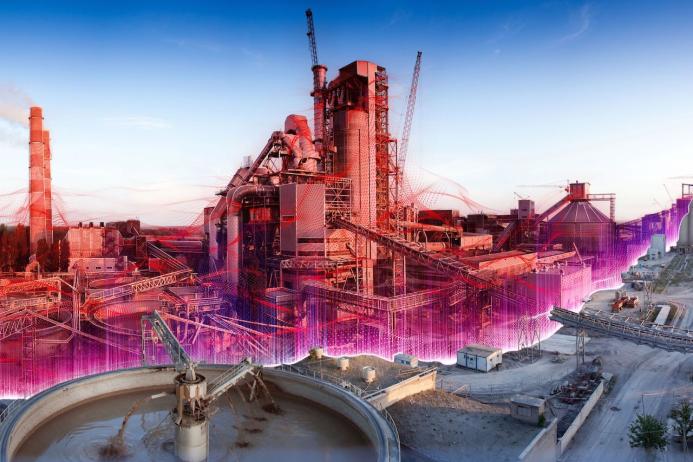ABB launch Do More With Digital campaign
Technology leader calls on cement companies to evolve operations by leveraging advanced solutions to bridge digital gaps
GLOBAL technology leaders ABB have today launched Do More With Digital, a global campaign highlighting the opportunities for the process industries to realize their full potential through digital transformation.
Leveraging their deep ties across mining, metals, cement, and pulp and paper, ABB say there is a significant opportunity to continue equipping these sectors with advanced industry-specific solutions, driving their digitalization journey and allowing them to accelerate their adoption curve in a shorter time frame.
Whilst all these industries will continue to be enhanced through technology development using the likes of generative artificial intelligence (Gen AI), data analytics, machine learning (ML), cloud and edge computing, they are also considered hard-to-abate due to the volume of production, location of operations, energy and heat chemistry, and many other factors.
The World Economic Forum reports that digital solutions can accelerate net zero in high-emission industries, delivering up to 20% of the total reduction that the International Energy Agency says is needed by 2050. By leveraging their experience of previous energy transitions, their recent record in industrial software development, and their 140 years of heritage across multiple industries, ABB say they have the ability to guide customers on their digitalization journeys.
The company has worked with customers across the process industries for decades, supporting them with the deployment of digital solutions such as advanced process control (APC), energy management systems (EMS), and manufacturing execution systems (MES). These have evolved from original packages to become variations used for distinct industries, with their own tools and libraries, and remain the foundation for advanced technology progression.
Recognizing that customers are at different stages of their digitalization journey, often with starters (those embedding digital for the first time), stallers (those piloting a new advanced solution, often with a start-up) or scalers (those moving to the next level, perhaps with a technology company), ABB are currently working across this ecosystem to jointly design and develop new solutions for current and future needs.
‘Adoption of advanced digital technologies is still much slower than one might expect in the process industries,’ said Sanjit Shewale, global business line manager for digital at ABB Process Industries. ‘Customers are facing new challenges in proving and scaling up solutions that will drive real, transformative change.
‘However, there are opportunities for all parties to use technologies to retain knowledge of processes in their business as people retire or move on in shorter time frames than was typical in the past. Through co-creation, there is the chance to show more and do more for positive investment decisions that quickly result in unprecedented levels of energy management, efficiency, sustainability, safety, and service.’
ABB are currently working with fellow global technology companies to integrate the likes of Gen AI capabilities into the ABB Ability suite of industrial software, helping industrial companies to improve data collection, unlock insights hidden in operational data, and enable significant gains in efficiency and productivity.
Partnerships also exist for initiatives to accelerate the adoption of digital solutions to help industries meet their goals on net-zero emissions. One such example is real-time data transmission using cloud-based software integrated with ABB systems.
In the cement industry, ABB are delivering digital solutions to use less energy and raw materials when producing cement, while also facilitating the use of alternative fuels, allowing the industry to operate with a smaller carbon footprint. Real-time decision making around asset performance and maintenance offers substantial process optimization and decision-making benefits.
For example, ABB customer Cemex were already utilizing ABB’s Expert Optimizer on key areas at their Rüdersdorf cement plant, in Germany, but sought to further improve their emissions control system. Working together, ABB implemented ABB Ability Expert Optimizer, significantly reducing emission variability and allowing the plant to operate closer to targets without exceeding limits. This resulted in both reduced operator workload through automatic sulphur dioxide (SO2) optimization and an 11% reduction in hydrate consumption.
Michael Marti, global business line manager for growth industries at ABB Process Industries, who works with the cement industry, said: ‘Cement production will continue to play a central role in global development. Therefore, driving down emissions on the path to achieving climate targets is imperative. ABB understand the complexities involved in this process and are working with the cement industry to unlock a future where cement production is efficient and environmentally responsible, and yet retains its high levels of quality. We believe that digitalization is one such vital key to this lock.’
ABB’s team embrace and consider what they refer to as five key pillars – operational excellence, process performance, asset performance, sustainability, connected workforce – all with embedded cyber security, when advising industries that need to keep up the rapid pace of innovation, optimize efficiency and, in turn, minimize energy waste and reduce costs.










